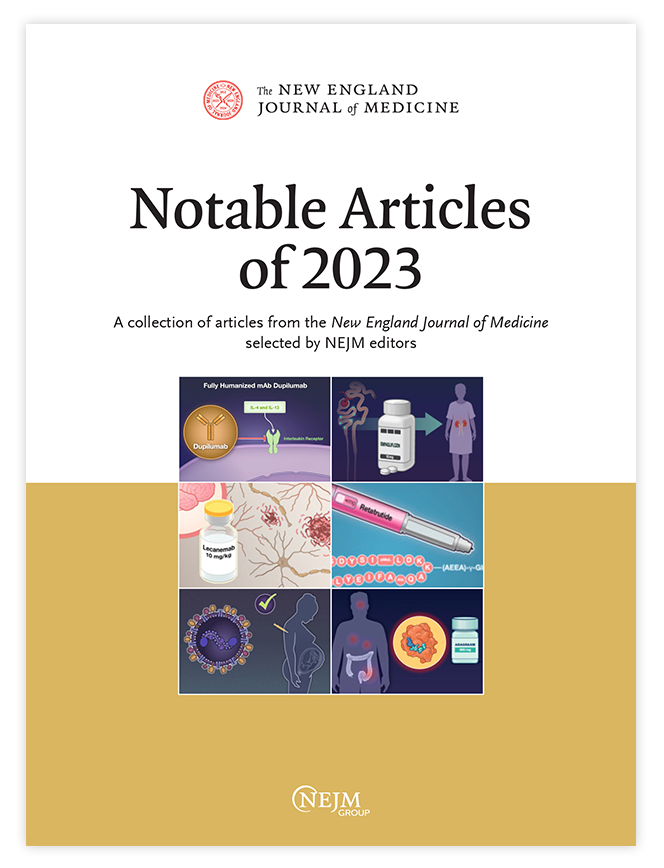Once-Weekly Mazdutide in Chinese Adults with Obesity or Overweight.
IF 96.2
1区 医学
Q1 MEDICINE, GENERAL & INTERNAL
引用次数: 0
Abstract
BACKGROUND Evidence suggests that incretin-based dual agonist pharmacotherapy is helpful in persons with obesity. Mazdutide, a glucagon-like peptide-1 and glucagon receptor dual agonist, may have efficacy in persons with overweight or obesity. METHODS In a phase 3, double-blind, placebo-controlled trial in China, we randomly assigned, in a 1:1:1 ratio, adults 18 to 75 years of age who had a body-mass index (BMI; the weight in kilograms divided by the square of the height in meters) of at least 28 or had a BMI of 24 to less than 28 plus at least one weight-related coexisting condition to receive 4 mg of mazdutide, 6 mg of mazdutide, or placebo for 48 weeks. The two primary end points were the percentage change in body weight from baseline and a weight reduction of at least 5% at week 32, as assessed in a treatment-policy estimand analysis (which assessed effects regardless of early discontinuation of mazdutide or placebo and the initiation of new antiobesity therapies). RESULTS Among 610 participants, the mean body weight was 87.2 kg and the mean BMI was 31.1 at baseline. At week 32, the mean percentage change in body weight from baseline was -10.09% (95% confidence interval [CI], -11.15 to -9.04) in the 4-mg mazdutide group, -12.55% (95% CI, -13.64 to -11.45) in the 6-mg mazdutide group, and 0.45% (95% CI, -0.61 to 1.52) in the placebo group, and 73.9%, 82.0%, and 10.5% of the participants, respectively, had a weight reduction of at least 5% (P<0.001 for all comparisons with placebo). At week 48, the mean percentage change in body weight from baseline was -11.00% (95% CI, -12.27 to -9.73) in the 4-mg mazdutide group, -14.01% (95% CI, -15.36 to -12.66) in the 6-mg mazdutide group, and 0.30% (95% CI, -0.98 to 1.58) in the placebo group, and 35.7%, 49.5%, and 2.0% of the participants, respectively, had a weight reduction of at least 15% (P<0.001 for all comparisons with placebo). Beneficial effects on all prespecified cardiometabolic measures were seen with mazdutide. The most frequently reported adverse events were gastrointestinal and mostly mild to moderate in severity. The incidence of adverse events leading to discontinuation of the trial regimen was 1.5% with the 4-mg mazdutide dose, 0.5% with the 6-mg mazdutide dose, and 1.0% with placebo. CONCLUSIONS In Chinese adults with overweight or obesity, once-weekly mazdutide at a dose of 4 mg or 6 mg for 32 weeks led to clinically relevant reductions in body weight. (Funded by Innovent Biologics; GLORY-1 ClinicalTrials.gov number, NCT05607680.).中国成人肥胖或超重患者服用每周一次的马度肽。
背景:有证据表明,以肠促胰岛素为基础的双重激动剂药物治疗对肥胖患者有帮助。Mazdutide是一种胰高血糖素样肽-1和胰高血糖素受体双重激动剂,可能对超重或肥胖的人有效。方法:在中国进行的一项3期、双盲、安慰剂对照试验中,我们以1:1:1的比例随机分配了年龄在18至75岁之间、身体质量指数(BMI;体重(以公斤为单位除以身高(以米为单位)的平方)至少为28或BMI为24至小于28,加上至少一种与体重相关的共存疾病,接受4毫克、6毫克的马都肽或安慰剂48周。两个主要终点是在治疗政策评估分析中评估的体重从基线变化的百分比和在第32周体重减少至少5%(无论早期停用马都肽或安慰剂和开始新的抗肥胖治疗,评估效果)。结果610名参与者的平均体重为87.2 kg,基线时的平均BMI为31.1。在第32周,4毫克马都肽组的平均体重变化百分比为-10.09%(95%可信区间[CI], -11.15至-9.04),6毫克马都肽组的平均体重变化百分比为-12.55% (95% CI, -13.64至-11.45),安慰剂组的平均体重变化百分比为0.45% (95% CI, -0.61至1.52),73.9%,82.0%和10.5%的参与者分别体重减轻至少5%(与安慰剂相比,所有比较P<0.001)。在第48周,4毫克马都肽组的平均体重变化百分比为-11.00% (95% CI, -12.27至-9.73),6毫克马都肽组的平均体重变化百分比为-14.01% (95% CI, -15.36至-12.66),安慰剂组的平均体重变化百分比为0.30% (95% CI, -0.98至1.58),分别有35.7%,49.5%和2.0%的参与者体重减轻至少15%(与安慰剂相比,所有比较P<0.001)。马都肽对所有预先指定的心脏代谢指标都有有益的影响。最常见的不良事件是胃肠道,严重程度大多为轻至中度。导致试验方案中断的不良事件发生率,4 mg马都肽组为1.5%,6 mg马都肽组为0.5%,安慰剂组为1.0%。结论:在超重或肥胖的中国成年人中,每周一次,剂量为4mg或6mg,持续32周,可导致临床相关的体重减轻。(由Innovent Biologics资助;GLORY-1 ClinicalTrials.gov编号:NCT05607680)。
本文章由计算机程序翻译,如有差异,请以英文原文为准。
求助全文
约1分钟内获得全文
求助全文
来源期刊

New England Journal of Medicine
医学-医学:内科
CiteScore
145.40
自引率
0.60%
发文量
1839
审稿时长
1 months
期刊介绍:
The New England Journal of Medicine (NEJM) stands as the foremost medical journal and website worldwide. With an impressive history spanning over two centuries, NEJM boasts a consistent publication of superb, peer-reviewed research and engaging clinical content. Our primary objective revolves around delivering high-caliber information and findings at the juncture of biomedical science and clinical practice. We strive to present this knowledge in formats that are not only comprehensible but also hold practical value, effectively influencing healthcare practices and ultimately enhancing patient outcomes.
 求助内容:
求助内容: 应助结果提醒方式:
应助结果提醒方式:


